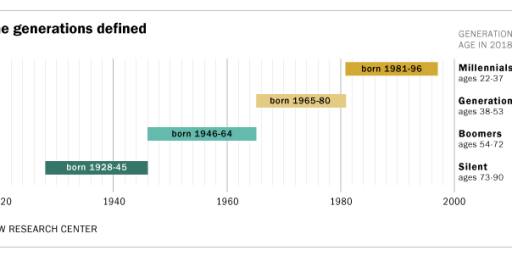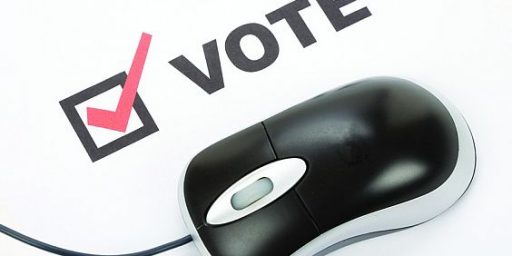Millennials Not Buying Cars or Even Getting Drivers Licenses
The under-35 set are buying cars at a lower rate than they used to.
The under-35 set are buying cars at a lower rate than they used to. And, no, it’s not because they’re lazy, entitled narcissists who still live with their parents. (Although, come to think of it, that would explain why they’re not buying cars–they just drive their parents’.)
NYT (“Young Americans Lead Trend to Less Driving“):
For six decades, Americans have tended to drive more every year. But in the middle of the last decade, the number of miles driven — both over all and per capita — began to drop, notes a report to be published on Tuesday by U.S. Pirg, a nonprofit advocacy organization.
People tend to drive less during recessions, since fewer people are working (and commuting), and most are looking for ways to save money. But Phineas Baxandall, an author of the report and senior analyst for U.S. Pirg, said the changes preceded the recent recession and appeared to be part of a structural shift that is largely rooted in changing demographics, especially the rise of so-called millennials — today’s teenagers and twentysomethings. “Millennials aren’t driving cars,” he said.
In fact, younger people are less likely to drive — or even to have driver’s licenses — than past generations for whom driving was a birthright and the open road a symbol of freedom. Research by Michael Sivak of the Transportation Research Institute at the University of Michigan found that young people are getting driver’s licenses in smaller numbers than previous generations.
Miranda Green (“Millennials move away from car ownership“) conjectures on the reasons why this may be.
What’s behind the dramatic, continued decrease? Two answers: the high cost of owning a vehicle and the increasing ease of public transport.
One of the more obvious reasons is the price associated with owning and driving a car. Even if the car is a birthday president from their folks, millennials are finding the cost of gas, parking and car insurance to be prohibitive – especially when they’re using a big chunk of cash flow to pay down student loans.
Meanwhile, public transport is also an appealing option, especially in city settings, where college educated 25 to 34-year-olds are increasingly flocking.
Here’s the PIRG summary:
The Millennials (people born between 1983 and 2000) are now the largest generation in the United States. By 2030, Millennials will be far and away the largest group in the peak driving age 35-to-54 year old demographic, and will continue as such through 2040.
Young people aged 16 to 34 drove 23 percent fewer miles on average in 2009 than they did in 2001—a greater decline in driving than any other age group. The severe economic recession was likely responsible for some of the decline, but not all.
Millennials are more likely to want to live in urban and walkable neighborhoods and are more open to non-driving forms of transportation than older Americans. They are also the first generation to fully embrace mobile Internet-connected technologies, which are rapidly spawning new transportation options and shifting the way young Americans relate to one another, creating new avenues for living connected, vibrant lives that are less reliant on driving.
If the Millennial-led decline in per-capita driving continues for another dozen years, even at half the annual rate of the 2001-2009 period total vehicle travel in the United States could remain well below its 2007 peak through at least 2040—despite a 21 percent increase in population. If Millennials retain their current propensity to drive less as they age and future generations follow (Enduring Shift), driving could increase by only 7 percent by 2040. If, unexpectedly, Millennials were to revert to the driving patterns of previous generations (Back to the Future), total driving could grow by as much as 24 percent by 2040.
All three of these scenarios yield far less driving than if the Driving Boom had continued past 2004. Driving declines more dramatic than any of these scenarios would result if future per-capita driving were to fall at a rate near that of recent years or if annual per-capita reductions continue through 2040.
Regardless of which scenario proves true, the amount of driving in the United States in 2040 is likely to be lower than is assumed in recent government forecasts. This raises the question of whether changing trends in driving are being adequately factored into public policy.
Certainly, a lot of young folks who live in dense urban centers don’t drive. Then again, that’s always been the case.
I’d imagine that $4 a gallon gas is a major factor. Then again, in most of the country, driving is really the only viable way to get to work, go grocery shopping, and otherwise accomplish the necessities of daily existence. Maybe people are driving fewer miles for optional trips, but you still need a car.
Unless you don’t have a job. In which case, you probably can’t afford a car.







In urban centers, there is the increasing ease of renting cars for a short time (e.g. ZipCars). In the cities owning can be a hassle, so this is a rational response. I also think that cars have become somewhat of a commodity, losing the “fun” aspect that cars that had when I was growing up. Back then, a new car was a new toy; now it’s a transportation appliance.
For months if not years I’ve been saying that core consumerist values (More stuff! More!) are devalued in coming generations. In short: they are not as in love with owning stuff as we were. They just aren’t. They’d rather have Twitter (free) followers than Air Jordans.
This will have complications for the economy. In fact, more people giving less of a damn about owning stuff just to own stuff, combined with the growing reality that automation really is finally obliterating jobs on a large scale, means economists really need to do some serious rethinking of their theories.
Consumption dropping and productivity rising with fewer employed folks? That’s a revolution. That’s a paradigm shift. And here’s a clue: libertarianism is dead. Dead, buried, stake through heart, dead. Because without some new redistributionist scheme to allow us to maintain large numbers of permanently unemployed, we will not be able to hold civilization together.
“Then again, in most of the country, driving is really the only viable way to get to work, go grocery shopping, and otherwise accomplish the necessities of daily existence.”
And yet in suburbia, telecommuting and grocery delivery services are reducing the need for the first two. The big crunch will be when they start having kids, as being free of bus schedules will become much more important.
I have a 16 year old. He’s figuring he’ll eventually get around to getting his license. Higher on his list of priorities? Reporting for his school paper.
Kids today. I got my license eight seconds after I became eligible. But these guys are different.
@michael reynolds: This is the kind of ideas that I remember reading in science fiction in the 60s. What happens when production becomes so efficient that you need very few people to actually produce? What are all these people who are not needed going to do? What do people do when there is no more want? How do we structure society where people don’t become self-destructive? There weren’t any answers but I always felt that not everybody could self-actualize by becoming artists, writers, etc.
I’m in the age group that is right on the cusp between Gen X and the Millenials (will turn 34 in a couple months), so I never know which group to include myself in.
But I’ll offer my own anecdote anyways. I can say that even though I and all of my friends are entering our mid-30s, by which time most people are settled into their “2 kids and a house in the suburbs” era of their life, a very large percentage of my friends still live in (and have no desire to leave) an urban area, and walk everywhere or take the subway when they are not traveling out of said urban area (Boston metro). They all have cars, but that is more because they all make really good money and enjoy the convenience. They actually drive very little, except when coming to visit me out in the suburbs.
When you combine that more millennials are living with their parents than previous cohorts with the high rate of unemployment among them, I think that’s a sufficient explanation.
Note, too, that in the Pew study cited above, the large proportion of millennials who reported not having enough money to live the lifestyles to which they aspired.
@michael reynolds:
How does your kid get to places necessary to do the research needed to report for the school paper? When I did that, I had to drive down for an interview a the juvenile justice system, drive around to solicit ads, etc.
Are they not driving because they have mom/dad taxi at their beck and call?
@JKB:
Back when you did that, there was no Internet, no email and texting, no cell phones, no Skype. A lot of things that you had to do in person back then — interview, research at the library or courthouse, look up old transcripts, solicit ads, etc. — can now be done via computer. There’s just not as much need to go places.
@JKB:
Yes, just how does your kid drive to the Internet?
Jake knows he can have a car – probably one of ours – once he passes all the tests. It’s not lack of means. It’s simply not a priority.
This trend preceded the recession. It’s not primarily economic. It’s something else for which I don’t have a name. They just don’t care about a McMansion, three cars, a boat and a well-stocked wine cellar. They’d actually prefer to be part of some car-sharing thing and not have the hassle of ownership. They don’t see stuff as the key to happiness the way we did.
@Rafer Janders:
And in many big cities, the subway is often much faster than driving for many of those places in the increasingly rare cases where you can’t look it up online. In fact, much of the time you can spend more time looking for parking than it takes to travel both ways on the subway.
I remember taking a cab to get about London when I first got there, and then learning that it takes a quarter the time and about a tenth the cost to take the tube.
But I’d guess medium sized cities and rural areas will still be using cars for awhile, as well as some of the big cities without subways.
I’m Gen X in suburbia, and I’m finding that I drive a lot less than I used to. Driving itself is more expensive with gas costs. Additionally, I take public transit to work. I mostly drive on weekends, and then only because the public transit to my particular corner of suburbia is not as frequent on weekends as I would like. If I lived downtown (or if the nearest Zipcar were not a mile away), I would likely sell my car.
Look at the crappy design cars that people drive these days. You can tell that young people aren’t “car guys” like us older guys, and certainly not “motorcycle guys” like me either. Many new cars lack personality and are now literally just transportation.
I wondered whether the cost of purchasing a car has outrun the inflation rate, but this table showed that from 1970-2006, the price of a new car in constant dollars hardly fluctuated. It was $19,266 in 1970 and $20,044 in 2006, both prices in 2006 dollars.
But wow, since 2006 the average cost has shot up 50 percent to almost $31,000, according to autoblog.
So I would say that the entry price is more influential on this generation than the preceding ones.
@Dave Schuler:
Millenials to baby boomer: “Thanks a bunch, guys!”
I think that this has a lot to do with it, but I also think there are other factors. Did your city install some kind of mass transit project in the last 20 years? If so, the young people in your city are aware that you can get around without a car.
@Dave Schuler:
Dave, the trend preceded the recent high unemployment. And it seems to be the case here in Marin County where not a lot of kids are enduring hard times. It applies to my own son, who can have a car if he wants.
And bear in mind that when I was a kid I also couldn’t afford a car — and yet I managed to get one. Because that was my priority.
Also, I think you’re missing another explanation: environmentalism. They see consumption as inherently suspect, not as inherently good, the way we did.
Also physical travel is less necessary — the internet, etc… That will apply to housing as well because a 2 bedroom apartment with fast internet is in many meaningful ways, larger than a 4 bedroom home without.
Also, as mentioned above, cars are no longer love objects, they are practical objects. No one has a romance with a Prius. (Well, maybe some old dudes who want good mileage.)
Finally, they are just about immune to advertising – a fact that makes my life more difficult. Peers are infinitely more powerful in their lives than any outside propaganda effort, and if you take some time to listen to them on Twitter and Facebook and look at the pictures and videos they post, you’ll find very little, “I want to get. . .” The lure of stuff is simply much less a part of their thinking.
It’s amusing that people who understand that other cultures can be very different from our own, reject the notion that our culture can change. I believe this is cultural not economic.
My nephew got a car to fit his surfboard, so that culture stll lives. (Retro?)
My almost 20’year old does not have her license and has no desire to drive. She is at college and her campus is a great walking campus and provides buses to various nearby places.
My 18 year old does drive but she uses our car. She will be attending college in Boston and won’t be taking or need a car there.
@michael reynolds: Yes, I started driving at 15 1/2 years and had to drive my parents around, including 12 hour runs to Florida.
Many young people can’t get a job and can not afford insurance, which is too high for that age group.
@Scott:
No, they won’t all be artists or writers or musicians, true. I have no idea what this means long-term. In the short term I think it means unemployment. When the entire western world has high unemployment while simultaneously improving productivity and generating profits, I think we need to look at the possibility that the old answers are no applicable.
McDonald’s could be completely automated right now, with existing technology. The only reason they aren’t is that wages in fast food are still low. But the cost of automation will drop, too, below the level where even starvation wages make much sense. Wait until they start to factor in the savings from pilfering and embezzlement. 10 or 20 years from now you will not be getting your burger from some pimply kid. You’ll order it on your app and the nice robot will cook it and serve it up for you.
Looks like we’ll be seeing a lot more support for decent mass transit.
Maybe the transportation future isn’t driverless cars: maybe its a far flung high-speed train network-cue John Persona telling us why a high speed train network won’t work. 🙂
@Tyrell:
If it mattered to them like it mattered to us, they would find a way. They find a way to own computers and smart phones. Cars are just not their be-all and end-all.
I keep dithering about the possibility of giving up my car because a) cost of parking, b) cost of insurance, c) damn thing breaks something every 10,000 miles and I hate having to worry about what’s gonna happen next. The problem is that Chicago isn’t really laid out for certain commuting patterns–we really need some Ringstrasses and trams that go on them (like Vienna).
Lived for 12 years in Japan and never once felt I needed a car. You can travel almost everywhere around Japan via public transportation, plus shipping and delivery services are all over the place.
One factor not addressed is that of the 0.08 BAC limit. This keeps kids off the road, too.
My son, a Millenial, had a car while living in LA. It was necessary to get to some of his jobs, though for others he could walk or use the LA subway. When he and his friends would go out on weekends, they’d go by cab so there simply wouldn’t be an issue with DUI. If they were going to the suburbs, then the host was expected to have the guests crash overnight.
Now that he’s moved to NYC, he sold his car. Both too expensive to operate and impossible to park for less than he pays in rent in the East Village. He can get where he needs to go by foot or by subway. When he wants to travel to Philly or DC, he either jumps Amtrak or the $25 buses.
@michael reynolds:
“I have no idea what this means long-term”
I suspect it means a smaller population long-term. With contraception close to universally available, and little prospect of their kids having a fulfilling life, many people will just choose not to have kids.
@michael reynolds: Yup, I am part of the Millennial generation and getting a car or a license isn’t a top priority anymore. There are some kids in my college courses who are 22+ and have yet to get their license.
I got mine at 17, and years ago that was considered late now that fairly early.
@Jr:
Just curious, what do they do when asked for ID at a bar?
Here’s a couple of thoughts that crossed my mind while reading this:
For 20 years, violent crime has been dropping steadily. Kevin Drum has argued that a lot of this has to do with the reduction of lead use, but it makes sense to extend this to this idea as well – urban flight had a lot to do with increasing crime rates, and where populations are more dense the crime rates will be higher as well. A lot of people like living in urban areas – easy access to a lot resources within close proximity (though there are trade-offs), and urban areas often have better public transportation. If I have access to reliable public transportation, I’m not going to own a car, which costs money to buy, money to maintain, and money to insure. Wages have been stagnant while car prices continue to inflate – I had to laugh when my mom was aghast at the idea that I might spend more than $20,000 on a car. That’s entry level for a reliable car anymore.
Along with reurbanization, we have major shifts in how society acts based on the rise of the Internet. I’m fairly tech savvy, but it was a shock to me to see my relatives from more urban areas of the country utilize all sorts of apps all of the time, but I get two major points from this – we’ve drastically increased the amount of social interactions we have (though changed the manner in which we have them), and we have far more access to resources for information and shopping. I don’t have to drive to the store to buy things anymore – I get on my smart phone and pull up my Amazon app and in two days whatever I ordered shows up at my door. I don’t have to meet up with my friends and catch up – I can keep tabs on them over the week by way of their Facebook updates and Twitter feeds. It’s not the same as face to face interaction, but it’s still social interaction. I don’t need to travel to interact with friends when the interactions are delivered right to my phone wherever I am. We don’t keep up with the Joneses by buying more and better stuff, we do it by having better gadgets with the latest software apps. Our method of interaction and competition has changed venues, not gone away.
@michael reynolds:
I think that there is another thing. Today, it´s much easier to have a comfortable life with less money. A smartphone can do more than ALL media consumption devices that people had in the past.
@Rafer Janders:
You can get a non-drivers state ID. That’s what I did for a really long time. I put off getting my license for a long time because driving always had me on the verge of a massive anxiety attack. So when I was in college and reached the age of 21, I just applied for a state ID that I used for proof of age. I didn’t finally get my license until I was 28.
@Chris Berez: Ha! I beat you!
I didn’t get my license until I was 42. Actually learned how to drive in London, and lemme tell you that there’s nothing more nervewracking than trying to navigate the Hammersmith roundabout (which is a circle of roundabouts around a central roundabout.)
P.S. For ID, I ended up using a whole collection of stuff–university ID, work ID, passport…
I especially loved the place that was hassling me about needing two IDs to use a check to pay for something, refusing to accept a U.S. passport, and insisting on a driver’s license. When I said: “ok, then I won’t buy it” their policy suddenly changed…idiots.
@grumpy realist: Hanger Lane roundabout. is worse, though I’ll admit that Hammersmith does require paying a bit of attention.
I’m one of those STEM graduates you hear so much about. I wince when politicians spout off on the topic because there just aren’t the jobs like there were. I work at a big box store, and the expense of having a car has me borderline homeless. Most of the engineers I know are now teaching math at high-schools and burning out quickly.
We created the middle class through redistribution, then turned off the spigot about 30 years ago and we’re turning back into a third-world country.
Also, Thomas Friedman, making a fortune by reassuring the elite that everything’s just peachy, should be fed through a troy-bilt chipper shredder.
Well, I am almost 42 and have been driving the same car since 2001. It was paid off in 2005. I probably would buy a new one if I didn’t have a student loan payment that was the same as a car loan payment would be.
As it is, I take one class per semester at the local community college so that I can get a bus pass for the semester (it is cheaper to do that than to buy the monthly bus passes). I live a mile from the park n ride where I pick up the commuter bus, and basically just use my car to go to the park n ride, for shopping, and the occasional road trip. I put less than 4,000 per year on it and fill the tank once per month or so. Basically, I have a self-funded ZipCar.
It isn’t just the Millenials that are getting clobbered. Tons of Gen X folks graduated college into a recession and then had the meager savings we acquired disappear overnight in 2001. Many of my friends have both crushing student loan debt [you know, the kind that can’t be discharged through bankruptcy – been there and done that!] *and* pre-teens expected to go to college in a few years.
One of my ‘millenial’ daughters lives in the city – as soon as she moved there she got rid of her car. Generally, she rents a car or shares a rental with friends when she wants to drive. She does not miss the insurance, the cost of parking, or the cost of maintenance of a car at all. the other daughter wants to move to the city and get rid of her car too – same reasons.
I wish I could do the same.
@Rafer Janders:
My non driving daughter isn’t old enough to drink so a license for that is moot but she has a state issued non driver ID. You get them at the DMV and they cost $10 in NH.
@stonetools:
You should not call it mass transit. You should call it public transportation. Outside of Manhattan, most workers drive to work and drive to shopping, schools etc.
And high speed trains have been shown to be a non-starters. It only makes sense in the northeast corridor and that area is too dense to build a new rail right-of-ways.
@grumpy realist: “I especially loved the place that was hassling me about needing two IDs to use a check to pay for something, refusing to accept a U.S. passport, and insisting on a driver’s license. When I said: “ok, then I won’t buy it” their policy suddenly changed…idiots. ”
People were having a laugh about this on a blog a few years ago, and somebody pointed out that a lot of check verification systems required a driver’s license number.
I parked my last car in 1996 and I haven’t looked back. Turns out if you need one, you can rent one, who knew? I have not missed it. The upkeep, the expense, the car trapped in a car smell, the crazy people on the road getting crazier as our fear is jacked through the roof, the sense of entitlement that driving is somehow a natural rung on an outdated social ladder.
But the biggest benefit has been ZERO interactions with taser-happy police who are likewise juiced up with the fear-stink.
When self-driving cars arrive (version 2.0; who wants to be inside v 1.0?) this trend will accelerate Eventually, you will just call for a car, and it will show up.
@ michael reynolds
My sense is that there is an interesting mix of hippie ideals and tech fluency cooking with the younger generation. A lot of them really seem to intrinsically get that the more/bigger/better model we grew up on is running out of steam. It will probably never make complete sense to our generation, and that is as it should be.
@Barry: For some reason this reminds me the problems the MIT Solar Car Team had in registering their vehicles for the road:
[DMV person]: “How many cylinders?”
[MIT SEVT person]: “0.”
[DMV person]: (types, gets frustrated, types again, then quits.) “Sorry, the computer won’t accept that….”
Someone finally went in and fixed the bloody code but for a long period of time people with electric cars in Massachusetts were having to register their cars as having one cylinder.
(This is why I cast an Evil Eye at reported statistics and take them all with large grains of salt.)